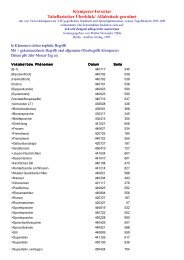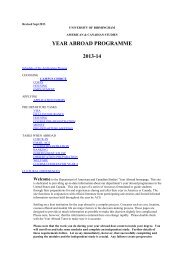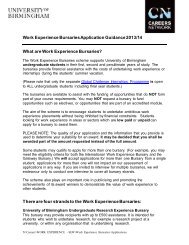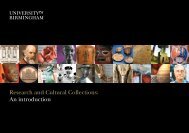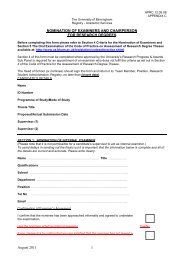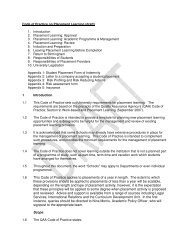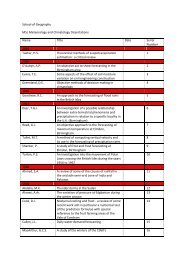reimagining-abstracts - University of Birmingham
reimagining-abstracts - University of Birmingham
reimagining-abstracts - University of Birmingham
Create successful ePaper yourself
Turn your PDF publications into a flip-book with our unique Google optimized e-Paper software.
from the premise that ethnik<strong>of</strong>rosyni is neither an ideology nor simply a variant <strong>of</strong><br />
Greek nationalism. Instead, it will suggest an alternative definition that interprets it as<br />
an anti-communist political system which used state propaganda - among other<br />
repressive instruments - to establish and spread itself.<br />
On this basis, the main section <strong>of</strong> the paper will focus on the prominent<br />
position accorded to Greek antiquity in the propaganda discourse <strong>of</strong> ethnik<strong>of</strong>rosyni.<br />
The analysis will draw on a variety <strong>of</strong> primary sources, including publicity leaflets on<br />
the ‘rehabilitation’ <strong>of</strong> communist prisoners, army sponsored pamphlets written by<br />
academics, press articles, radio broadcasts and highly publicised political speeches.<br />
The extensive deployment <strong>of</strong> ancient themes and their use in allegorical fashion to<br />
fight Greek Marxism will be analysed to support three central conclusions:<br />
a) Ethnik<strong>of</strong>rosyni used Greece’s classical past in a highly superficial and<br />
instrumentalist manner with the aim <strong>of</strong> portraying the culture <strong>of</strong> the ancients<br />
as a monolithic totality amounting to a unified worldview.<br />
b) Ancient Greek themes were also deployed as propaganda vehicles to suggest<br />
that Western ideas about the Cold War were essentially similar with the<br />
parochial values <strong>of</strong> Greek nationalism.<br />
c) Classical themes were also projected in ethnik<strong>of</strong>ron propaganda because <strong>of</strong><br />
their totemic function as psychological tools capable <strong>of</strong> evoking deep rooted<br />
symbols and taboos which many Greeks developed through early education.<br />
Vassiliki Kolocotroni<br />
Writing Remains: Heidegger and Derrida in Greece<br />
Heidegger and Derrida both claim to have delayed their trip to Greece, and like Freud<br />
before them wrote <strong>of</strong> the visit in terms <strong>of</strong> uncanny anticipation, meditating on<br />
memory, language and death. This paper considers those philosophers’ accounts <strong>of</strong><br />
the visit to Greece, Aufenthalte (1962) and Athènes à l’ombre de l’Acropole (1996),<br />
with a view to drawing out the motifs through which they stage in their writing<br />
modernity’s exemplary encounter with antiquity, which in a different context Jacques<br />
Rancière has called the ‘archaeomodern turn’. Cast in the form <strong>of</strong> an insistent<br />
questioning <strong>of</strong> the possibility <strong>of</strong> return, Heidegger’s ruminations on (and in) Greece<br />
suggest a constant negative as well as a wonderment in the presence <strong>of</strong> empty temples<br />
and still inhabited words (‘Afaia’, ‘Delos’). Derrida’s homage to Greece’s ‘luminous<br />
memory’ is likewise preoccupied with language and the dwelling on (and in) what<br />
remains, as ruin and abode, while reflecting on the photographic image as an<br />
apparatus for mourning and recollective thinking.<br />
Polina Kosmadaki<br />
kosmadaki@benaki.gr<br />
Modernism and Antiquity: Parisian perspectives and Greek artists<br />
during the interwar period<br />
Europe <strong>of</strong> the interwar period was going through a re-evaluation <strong>of</strong> notions <strong>of</strong><br />
tradition. With Paris as its centre, modern art was <strong>of</strong>ten linked to styles <strong>of</strong> the past and<br />
to claims <strong>of</strong> national identity. In this context, and given that most Greek modern<br />
artists passed by and spent time in Paris, the influence <strong>of</strong> artistic movements <strong>of</strong> the<br />
time conditioned not only the general directions that Greek art took, but also the way<br />
that Greek artists chose to confront their ancient past. In this paper, I wish to<br />
demonstrate the role that French thought and discourse regarding Antiquity played for<br />
the development <strong>of</strong> modern art in Greece.<br />
12




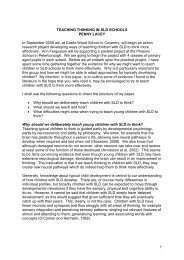
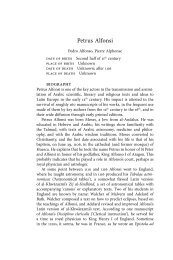
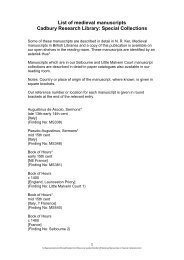
![Benyamin Asadipour-Farsani [EngD Conference abstract]](https://img.yumpu.com/51622940/1/184x260/benyamin-asadipour-farsani-engd-conference-abstract.jpg?quality=85)

